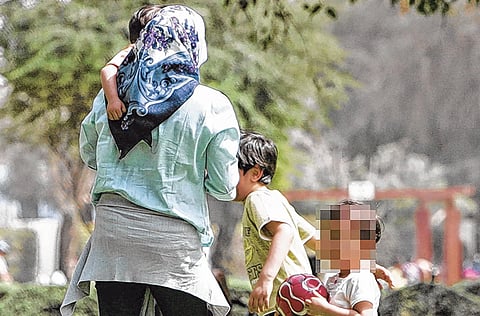We cannot afford to ignore our future generation
Institution of marriage is being slowly threatened by the callous attitude of parents

After about a week of Ramadan had passed, and I had had enough of the soup and samosa, I felt the urge for a pizza for sahoor, and expressed my culinary wants to my wife who shook her head in surprise with “pizza in Ramadan!”, but she was a sport and willing to indulge me.
Around 11 in the evening we stopped at the popular pizza outlet on one of the main thoroughfares in the city. As we made our way and sat down in one of the booths, I could not help but notice that the place was very active. The presence of a large play area seemed to attract a lot of young ones. My wife ordered a salad and I a small pizza.
While seated and quietly discoursing on events, I kept being bumped at the back of my head from someone in the booth behind me. It was an annoying sensation, and I had to turn around and settle matters. Standing behind me on the seat was a five-year-old who was the reason for my agitation. He was exploring the back of my head with a plastic toy. Next to him sat his sister who could not have been more than three years old. Across them sat a nanny who presented me with an apologetic, somewhat frightened look.
I quietly urged the boy to sit down in his seat and wait for his food. I also inquired from the nanny where the parents were. The nanny meekly responded that the father was out with friends and the mother was at home entertaining. OK, I figured, maybe there was a reason. By this time though, the nanny had apparently gathered enough resolve and courage to tell me that this was not an isolated incident. It happened all the time.
She was educated, this nanny, and concerned with the apparent lack of love and attention her two charges were receiving at the hands of their parents. In fact, she felt that she had taken some of the mother’s roles over by default. “Look around you,” she volunteered, “and see how many children are here with their nannies.” Sure enough, a quick glance around the dining hall seemed to affirm her statement.
There were kids everywhere, and very few parents in sight. Most were not fortunate to have an educated nanny who may have tried to maintain some discipline or control. In fact, some of the nannies were not much past puberty themselves and seemed awed by the events surrounding them. The children sat at tables, on them, and even crawled underneath them. And once they were done with that, they went to the next table.
They harried their nannies; they ignored their food. The poor waiters had to spend more time cleaning up spilt food off floors than to cater to servicing the needs of the clientele. Those few kids who were sitting quietly with their parents were just mesmerised by the activity of these parentless children. I could see that this sprinkling of parents was attempting with great difficulty to restrain their children’s natural inclination to join in the unrestrained fun.
Two African nannies swept by me, each one holding on to a child who could not have been more than six or seven years old. Both the little boys were boisterous and were attempting to break away from their nannies’ grasp. What struck me as odd was that one of the children, barely a toddler, was busily chatting away on a cellular phone as he was being led to a table. He was loud too! I was even more surprised when a few minutes later, the other kid took out a cellular phone from a pocket in his shorts and started using it.
It truly saddened me — this spectacle. These children, in the most formative years of their lives, were an abandoned lot. It does not take one to be a social scientist to figure out the shape of the tree of the future that we are planting today, and such situations cannot be excused simply to the overindulgence of parents. No, this is more a case of desertion. In the Nordic countries, it is often referred to as child abuse. Yet in most parts of the Gulf, the presence of nannies has somehow transformed them into adoptive parents.
In our society today the institution of marriage is being slowly threatened by the callous attitudes the partners have for such a union. In return, the fate of most children is being sealed within such a toxic relationship. Marriage counselling, a duty that traditionally rested with in-laws, is gradually eroding as the distances between married couples and their elders increase. There must be a national resolve to encourage the establishment of qualified counselling centers and trained counsellors to arrest this trend.
We cannot bask in the glory of newly opened airports or soccer stadiums. Our wealth is in these kids, and it is they who shall determine the course of tomorrow. Let us individually pay attention to where it matters most.
— Tariq A. Al Maeena is a Saudi sociopolitical commentator. He lives in Jeddah, Saudi Arabia. Twitter: @talmaeena


